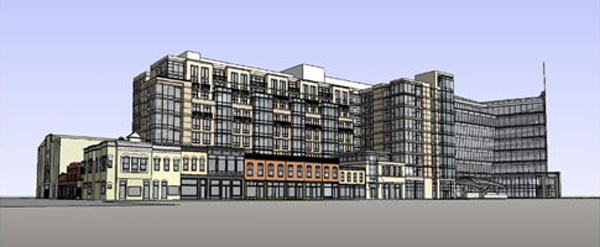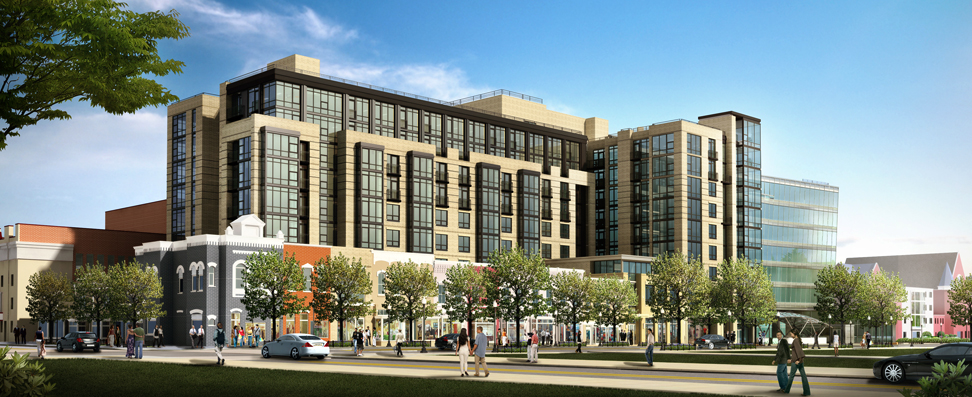The Howard Theatre and the value of public investment
The Howard Theatre’s renovation, in which the District government invested $12 million, got us thinking about the role of public finance in development projects. The use of public money or, alternatively, the granting of tax abatements to private projects, elicits controversy. Opponents argue that such investments are give-aways to well-connected businessmen.
 In the case of the Howard Theatre, the District’s investment in the venue, which the District government technically owns, is a good investment that is economically justified. The new venue and streetscape in front will improve the perception of the area and thus improve property values in LeDroit Park. The former is an improvement to the quality of life while the latter is an improvement to the District’s tax base.
In the case of the Howard Theatre, the District’s investment in the venue, which the District government technically owns, is a good investment that is economically justified. The new venue and streetscape in front will improve the perception of the area and thus improve property values in LeDroit Park. The former is an improvement to the quality of life while the latter is an improvement to the District’s tax base.
Though the theater is technically just outside LeDroit Park, the path from the Shaw Metro Station to LeDroit Park typically brings people in front of the theater. When the District-owned theater was decaying and vacant, it served as an awful first impression of the area. A barbed wire fence under the awning and marquee made visitors well aware that a strong wind gust could cause the awning to collapse. The heaps of litter and scurrying of rats certainly didn’t help perceptions, either.
Work crews are reconstructing the entire street, including sidewalks and lamp posts, and when the renovated theater opens next month, much of the former blight will be removed. Smooth, wheelchair-accessible sidewalks will replace broken concrete. Lamp posts will provide ample light. A statue on the sidewalk and a statue atop the theatre will add to the sense of place for this important historic venue.
The theater itself, renovated and gleaming, will attract patrons several nights a week and the building will have to remain in good order. Clean surfaces and façade adornments will replace trash, decay, and danger. The block will be unrecognizable from before.
These improvements will undoubtedly improve how visitors and residents view the block and perhaps how they view LeDroit Park. The quality of life improvements are certain. From a financial standpoint, the improvements will likely boost surrounding property values and thus property tax revenues for the District. In doing so, the additional revenue may far exceed the $12 million of public money invested in the site.
Correction: An earlier version of this post understated the dollar amount of the city’s investment.
7th & T was always the seedier end of the U Street corridor
This is the second in a series on the Scurlock photo archive. Read the first entry.
During the Jazz Age of the 1920s and later into the 1930s, U Street was dubbed the “black Broadway” as it featured such venues as the Lincoln Colonnade (now the Lincoln Theater), the Howard Theatre, and other clubs and restaurants. In a segregated city in which blacks were excluded from most restaurants, theaters, and stores, U Street served as a refuge to catch a show and enjoy a meal.
This photo from the Scurlock archives was taken looking east at 7th and T Streets NW in 1939.
[Toggling between now and then photos will not work in RSS readers. View the actual post]
We have referred to this area as the block of blight for its dilapidated buildings, copious litter, and frequent police arrests. It turns out that some things never change. Even when this photograph was taken, U Street was not uniform in character and the area around the Howard Theatre was considered downscale compared to the classier venues west on U Street. (For more on U Street’s evolution, see Blair Ruble’s recent book, Washington’s U Street: A Biography.)
Pictured here at the corner is National Grill, which, like Harrison’s Café in LeDroit Park, advertised itself as open all night. The lighted vertical sign attached to the façade appears to read “LUNCH” and the pediment at the cornice bears the building’s name, “Scott’s”. (View a larger version of the photo.)
Just to the right (south) of National Grill is the S.W. Keys Luncheonette, whose vertical sign advertises coffee and waffles. Just south of that is Harlem Cafe, located in a building that has since been replaced.
On T Street, just behind Scott’s Building and just before the Howard Theatre, you will see a sign that reads “BILLIARDS”. That marks Frank Holliday’s pool hall, a popular gathering spot for Howard scholars, jazz musicians, and city laborers alike. Duke Ellington captured the scene at the pool hall:
Guys from all walks of life seemed to converge there: school kids over and under sixteen; college students and graduates, some starting out in law and medicine and science; and lots of Pullman porters and dining-car waiters.
Just beyond the pool hall, you’ll see the Howard Theatre sporting its original Italianate façade. The theater was later covered with plaster, which was only recently removed for the restoration project.
Today the last two buildings on 7th Street are a Chinese take-out and a tiny market. One of the developers of Progression Place, the large development project underway on the block (rendering below), said that the late owner of these two buildings refused to sell to his development. Progression Place will incorporate every building on this block except for these two.
If anyone is looking for a two-building restoration project, here is your chance!
Robbery in Shaw
This email came through the neighborhood listserv.
On Saturday evening at 7pm en route to Shaw metro north entrance, I was jumped from behind and wrestled to the ground by a teenage thief trying to steal my iphone. Rather than risk being stabbed, I let go of the iphone. What is disturbing is that this is a busy road with many pedestrians walking by, yet not one person stopped to help, including the shopkeepers stood on the doorsteps. When I asked for assistance, I was told to use the payphone on the corner of 7th and T which is where the gang of teenagers preying on their victims hang out in the evening – including the evening I was attacked. There were 10 or 12 on the corner of 7th and T and all fled after I was robbed. A good Samaritan let me use his cellphone to call the police who arrived in under two minutes. They said they are aware of the gang on 7th and T and have been monitoring them, yet the brazen robberies and attacks in broad daylight continue unabated.
Given the proximity to the Howard Theater, I’m sure this kind of publicity will not be welcomed given the Theater’s planned reopening later this year. I have now been forced to avoid the Shaw metro and will take the U Street Cordoza location instead. Anyone walking in the vicinity of 7th and T should hide their cellphones. Ironically, I am a playwright, my most recent work being about race relations in DC. It is poignant I was attacked in the shadow of Howard Theater.
What a terrible incident, but we’re glad nobody was hurt.
The Block of Blight (600 block of T Street NW) is a perennial source of criminality, as confirmed by the MDP’s regular listing of arrests. The frequency of crime at the corner of Seventh and T Streets warrants a more frequent police presence that the area lacks.
We usually walk our friends to the Metro late at night lest they fall victim to this sort of incivility. Blight encourages crime and both are on display near the Shaw Metro Station. We gently, but consistently, remind visitors that the station and surrounding blight are actually in the Shaw neighborhood, not LeDroit Park, but hopefully we won’t have to reiterate that nuance forever.
Renovations on the Howard Theatre have already begun and the developer for the mixed-use UNCF project at the Metro assures us that the groundbreaking for that project is a month or two away.
Buildings and Booze
Tomorrow is the first Thursday of the month, meaning that ANC1B’s monthly meeting will take place on the second floor of the Reeves Building at 14th and U Streets at 7 pm.
Here are the highlights from the official agenda:
- 1916 Ninth Street NW — variance from lot occupancy requirement; variance for expansion of non-conforming building; special exception for change from one non-conforming use to another.
- Dogs by Day and GreenPets — special exception to zoning.
- 321 T Street NW — review of conceptual design.
- Broadcast Center One PUD (to be built above the Shaw Metro) — motion for two-year extension and amendment.
The last item is the most worrying as it concerns the proposed development above the Shaw Metro station. This development, which is intended to restore the Howard Theater and the Block of Blight was supposed to break ground last year with a gleaming new office building to house Lanham-based Radio One. The developer is likely to secure an additional tenant, the United Negro College Fund, if the City Council grants the group’s request for $3.8 million in tax breaks over ten years to move here from Fairfax County.
Also on the agenda are the following liquor license applications:
- MASA 14, 1825 Fourteenth Street NW — Substantial change to license: addition of roof deck, proposed summer garden, expansion of hours (Sunday – Thursday 8 am – 2 am; Friday – Saturday 8 am – 3 am)
- Bella, 900 Florida Avenue NW — New retail Class C restaurant license with entertainment including dancing and live bands; hours of liquor sales and consumption (Sunday – Thursday, 11 am – 2 am; Friday – Saturday 11 am – 3 am); hours of entertainment (Sunday – Thursday 8 pm – 2 am; Friday – Saturday, 10 pm – 3 am)
- Ulah Bistro, 1214 U Street NW — Substantial change to license to provide new entertainment endorsement including DJ and jazz band (Sunday-Thursday, 9 pm – 1:30 am; Friday – Saturday, 9 pm – 2:30 am)
Good Morning, Shaw

Broadcast Center One as viewed from the CVS at 7th & T Streets
The Block of Blight is one step closer to renewal. Ellis Development Group, which is also restoring the Howard Theater, plans to build 100,000 square feet of office space for Lanham-based Radio One and TV One, along with 22,000 square feet of retail space and 200 condos at the Shaw Metro’s northern entrance. The project, Broadcast Center One (pictured above), was supposed to break ground in September, but obviously it has been delayed.
The project may be one step closer to construction, though. In October the Washington Business Journal reported that the United Negro College Fund (UNCF) was considering leasing some office space in the project. On Thursday, our ANC Commissioner Myla Moss (ANC1B01) confirmed that UNCF had inked a deal to lease some of the space. It’s easier for a developer to secure financing and start construction the more signed leases they have beforehand.
New Year, New Tax
Happy New Year!
Now pay up.
 Our city council and mayor, ever desperate for new sources of revenue, have levied, effective today, a five-cent tax on every paper and plastic bag. So unless you carry reusable bags in your pockets for every unforeseen trip to the store, get ready to shell out.
Our city council and mayor, ever desperate for new sources of revenue, have levied, effective today, a five-cent tax on every paper and plastic bag. So unless you carry reusable bags in your pockets for every unforeseen trip to the store, get ready to shell out.
The stated purpose of the tax is to clean up the Anacostia River and three or four cents of every nickle collected will go to the Anacostia River Protection Fund. Some stores have the option of offering a five-cent credit to customers who bring their own bags. In such cases, store owners will be allowed to keep two of the five cents of the tax they collect.
The bag tax applies to every store that sells food or alcohol. Since Best Buy sells candy near its check out lines, the tax applies there, too; you’d better take a reusable bag to carry your new DVD player home on the Metro.
Paper bags, which are biodegradable, are also taxed, not because of any potential impact on the Anacostia, but because of politics: store owners feared that a tax on plastic bags would encourage customers to opt for their more expensive paper counterparts.
For those who own cars (your author is not one of them), it might be easy to store one’s bags in the trunk and to pull them out at the store. The rest of us are expected to carry bags on our persons, which is a nuisance that the mayor, with his city-provided SUV, and the council, with their free street parking in front of the Wilson Building, probably don’t understand.
Our biggest complaint about this tax is not so much the money, but the degree of condescension it exudes, implying that those who use plastic bags are sinners destroying the Anacostia. Readers of this blog will note our distaste for litter, especially the heaps of it that pile up in front of the Howard Theater on the Block of Blight. It’s easy to levy a feel-good tax, whereas a sustained effort to fine people who litter and to sanction businesses whose customers litter isn’t nearly as sexy.
New Year, Newspeak
Adding to the condescension is the legislation’s wording, which refers to the tax by the more innocuous word fee, as though city residents are too stupid to identify a tax when they see it.
The District Department of the Environment, which is responsible for administering the new tax (oops, I mean “fee”) has jumped on the Orwellian bandwagon, too, refusing to use the word tax. Even worse, their campaign against plastic bags (see the image above) is an exemplar of newspeak, urging us to “skip the bag [to] save the river”. For those of use who don’t litter— the majority of District residents— to “skip the bag” will not “save the river” since we wouldn’t have littered anyway and by reusing other bags, we avoid paying the tax to finance the river clean-up. Ironically, by skipping the bag, we are not helping to save the river.
Cleaning up the river is a worthwhile goal, but levying yet another regressive excise tax wrapped heavily in moralistic rhetoric is neither honest nor fair. Financing river cleanup should come from proven sources of river pollution, including sewers (by taxing water bills), impervious real property (WASA already charges a fee for this), and by enforcing anti-littering laws more aggressively. Many of us, the majority I’d expect, use plastic bags and dispose of them responsibly so they don’t soil our communities and rivers. Nonetheless, we are the scapegoat pretext for this new tax.
We are willing to bet a shiny nickle that this latest feel-good tax will do little to curb littering and we expect the heaps of garbage to continue to pile up in front of the Howard Theater.









Recent Comments